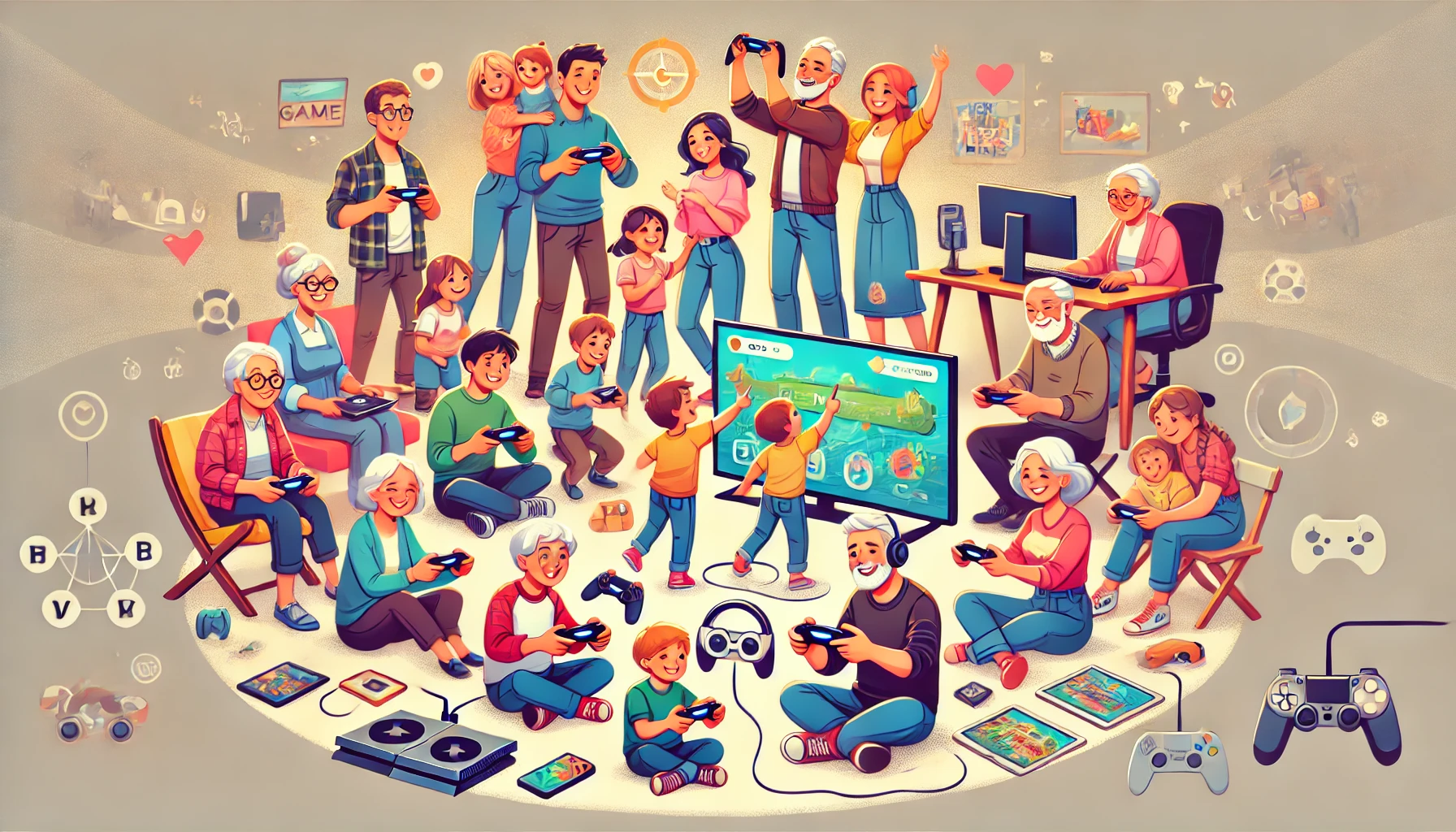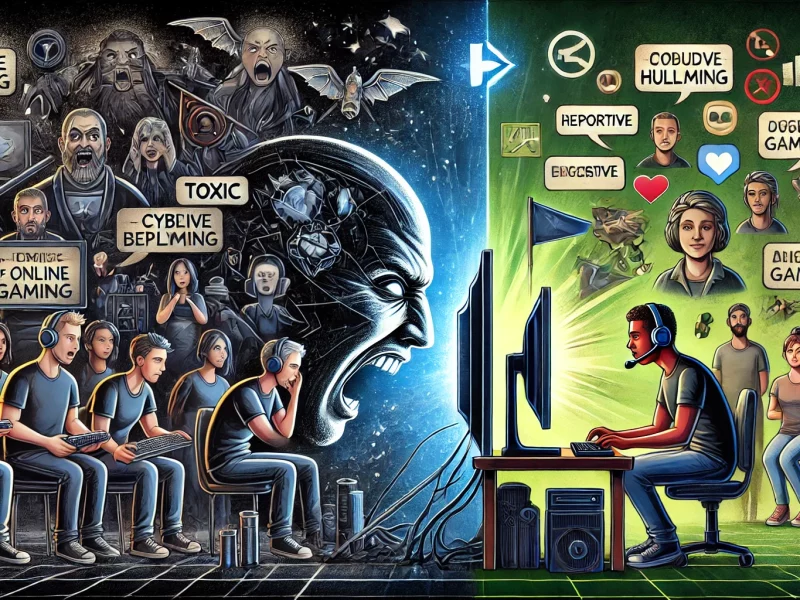In today’s digital age, online gaming is more than just entertainment—it has become a social platform that connects people across different backgrounds, cultures, and even generations. While video games were once seen as a pastime primarily for young people, they are now enjoyed by individuals of all ages. From children and teenagers to parents and grandparents, gaming has evolved into a shared activity that fosters relationships and strengthens family bonds.
As more generations engage with online gaming, they are discovering new ways to communicate, collaborate, and understand each other. This article explores how online games are bridging generational gaps, the benefits of cross-generational gaming, and tips for families looking to enjoy games together.
1. The Growing Popularity of Gaming Across Generations
Gaming Is No Longer Just for Kids
The stereotype that video games are only for teenagers has long been outdated. According to recent studies:
- The average age of a gamer is now around 35 years old.
- Over 50% of adults play video games, with many engaging in online gaming.
- A growing number of seniors (aged 60 and above) have started playing games, often to connect with younger family members or as a form of cognitive exercise.
How Generations Interact in Online Games
Different age groups approach gaming in unique ways, but online games provide a common space where generations can come together. Some examples include:
- Parents playing cooperative games with their children, such as Minecraft or Fortnite, to share quality time.
- Grandparents joining puzzle and strategy games like Words With Friends or Chess.com to stay mentally active and connect with younger relatives.
- Families competing in online racing or sports games, such as Mario Kart or FIFA, as a fun bonding activity.
Gaming is no longer an individual hobby; it is becoming a shared generational experience.
2. How Online Games Foster Intergenerational Connections
1. Encouraging Communication and Teamwork
Many online games require teamwork, strategy, and communication, making them an excellent way for family members of different ages to work together.
- In cooperative multiplayer games, such as Overcooked! or Among Us, players must collaborate and problem-solve together, strengthening relationships through shared challenges.
- MMORPGs (Massively Multiplayer Online Role-Playing Games) like World of Warcraft or Final Fantasy XIV allow players to form guilds and complete quests together, fostering long-term connections.
- Strategy and board game adaptations, like Catan Universe or Risk Online, encourage thoughtful discussions and friendly competition among generations.
By playing together, families build communication skills and teamwork habits that extend beyond gaming.
2. Learning from Each Other
Gaming offers a unique environment where knowledge can be exchanged between generations:
- Younger players teach older family members how to use modern technology, controllers, and gaming mechanics.
- Older generations share problem-solving skills, strategic thinking, and patience with younger gamers.
- Grandparents and parents engage in gaming trends, staying informed about new technology and interests of younger family members.
This exchange of knowledge strengthens relationships and breaks down barriers between age groups.
3. Creating Meaningful Memories
Playing games together leads to shared experiences and lasting memories. For many families, gaming has become a tradition, much like board games or watching movies together.
- Online multiplayer games offer a space for long-distance family members to connect regularly, even if they live in different cities or countries.
- Holiday gaming sessions, such as playing Jackbox Party Pack or Nintendo Switch Sports, bring laughter and fun to family gatherings.
- Co-op games like Animal Crossing allow grandparents to visit their grandchildren’s virtual islands, engaging in lighthearted activities together.
Through gaming, families can build traditions that span generations.
3. The Benefits of Cross-Generational Gaming
1. Strengthening Family Bonds
Many parents and grandparents find that gaming provides an easy and enjoyable way to connect with younger family members. Instead of passive activities like watching TV, online gaming offers:
- Active engagement, where all participants contribute to the experience.
- Mutual learning opportunities, as players teach each other new skills.
- A sense of togetherness, even if family members live far apart.
2. Improving Cognitive and Motor Skills
For older generations, gaming is more than just fun—it has cognitive benefits, including:
- Improved memory and problem-solving skills through puzzle-based and strategy games.
- Enhanced hand-eye coordination, especially in action or simulation games.
- Increased adaptability and digital literacy, helping older adults feel more comfortable with technology.
Games like Brain Age, Sudoku apps, or classic adventure games are often used as cognitive exercises for seniors.
3. Reducing Generational Stereotypes
One of the most significant impacts of gaming across generations is the breaking of stereotypes:
- Older adults see that video games are not just “mindless entertainment” but can be educational and engaging.
- Younger players gain respect for older generations when they see their skills and strategies in action.
- Gaming encourages mutual understanding, showing that people of all ages can enjoy the same hobbies.
By gaming together, families bridge generational gaps and build stronger connections.
4. Tips for Families Wanting to Game Together
If you’re looking to introduce cross-generational gaming into your family, here are some tips to make the experience enjoyable for everyone:
1. Choose Games That Suit All Ages
Not all games are suitable for every generation. Select games that are:
- Easy to learn (e.g., Mario Kart, Minecraft, Stardew Valley).
- Family-friendly (e.g., Animal Crossing, Super Smash Bros., Jackbox Party Games).
- Casual and engaging (e.g., Tetris, Puzzle & Dragons, Among Us).
2. Be Patient and Supportive
For older family members new to gaming, the learning curve can be steep. Encourage them by:
- Starting with simple controls before moving to complex mechanics.
- Offering guidance and positive reinforcement during gameplay.
- Celebrating progress, no matter how small.
3. Use Gaming as a Way to Stay Connected
If family members live far apart, online gaming can serve as a virtual family gathering space. Set up:
- Weekly or monthly gaming nights to keep in touch.
- Voice or video chat while playing for a more interactive experience.
- Shared in-game goals, such as completing a quest or building a virtual town together.
Gaming can be a powerful tool for maintaining relationships across distances.
Conclusion
Online gaming is proving to be much more than a simple pastime—it is a bridge connecting generations. Whether it’s a parent teaming up with their child, a grandparent learning from their grandkids, or a family coming together over a multiplayer game, the power of gaming to unite people of all ages is undeniable.
By embracing cross-generational gaming, families can create stronger bonds, break stereotypes, and share unforgettable experiences. So next time you sit down to play a game, invite a family member of a different generation—you might just discover a whole new way to connect.
Gaming isn’t just for the young—it’s for everyone! 🎮👨👩👧👦✨


